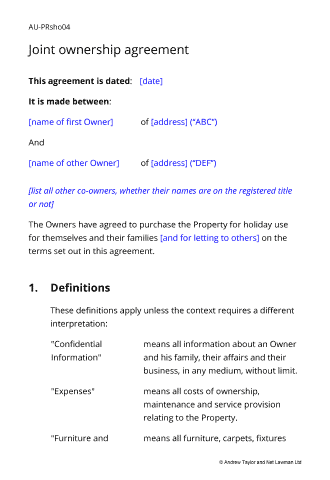Joint ownership agreement

Document overview

 ACT
ACT NSW
NSW NT
NT QLD
QLD SA
SA TAS
TAS VIC
VIC WA
WA

- Length:13 pages (3381 words)
- Available in:
 Microsoft Word DOCX
Microsoft Word DOCX Apple Pages
Apple Pages RTF
RTF

If the document isn’t right for your circumstances for any reason, just tell us and we’ll refund you in full immediately.

We avoid legal terminology unless necessary. Plain English makes our documents easy to understand, easy to edit and more likely to be accepted.

You don’t need legal knowledge to use our documents. We explain what to edit and how in the guidance notes included at the end of the document.

Email us with questions about editing your document. Use our Lawyer Assist service if you’d like our legal team to check your document will do as you intend.

Our documents comply with the latest relevant law. Our lawyers regularly review how new law affects each document in our library.
About this document
This fractional ownership agreement covers any situation where parties share ownership and use of a house, flat or other property for holiday occupation.
The agreements are designed to regulate occupation where only one owner occupies the whole of the property at any one time. However, there is nothing to prevent more than one owner occasionally using the property at the same time.
First, you should consider the most suitable structure for your sharing proposal. If you are looking at a commercial arrangement or one for more than ten people, then it would be better to hold the property in a limited company and buy and sell shares in it. Then ownership of the property itself never changes. No stamp duty is paid once it is bought as the right of occupation can be treated as a licence.
However, running a company does cost money, so between 2 and 10 owners it is a matter of preference as to whether you want the formality, expense and greater certainty of a company structure and shareholders agreement or the lower cost and comparative informality of an agreement like one of these.
These Net Lawman agreements specifically record the shares in which land (that is, property) is held. They also record shares which may be owned by someone who is not a registered owner. This is called a beneficial interest.
Contents
- Terms of beneficial interest - beneficial trusts provision;
- Price and payment for the Property;
- How many people allowed into occupation at one time and who they may be;
- Who and how will manage payment of expenses;
- Management of the property;
- Detailed management structure ordered by annual meetings of the owners, possibility of proxy voting, and more;
- Undertakings by the parties;
- Alternative exit strategies to allow for a share to be sold to a third party, after offering it to all other owners;
- Effect of termination;
- What if someone wants to sell his share or sell the property;
- Other legal provisions to protect your interest;
- Explanatory notes.

Recent reviews
Very useful information. Would recommend to others.
Price very reasonable.
Choose the level of support you need
Document Only
This document
Detailed guidance notes explaining how to edit each paragraph
Lawyer Assist
This document
Detailed guidance notes explaining how to edit each paragraph
Unlimited email support - ask our legal team any question related to completing the document
- Review of your edited document by our legal team including:
- reporting on whether your changes comply with the law
- answering your questions about how to word a new clause or achieve an outcome
- checking that your use of defined terms is correct and consistent
- correcting spelling mistakes
- reformatting the document ready to sign
All rights reserved
